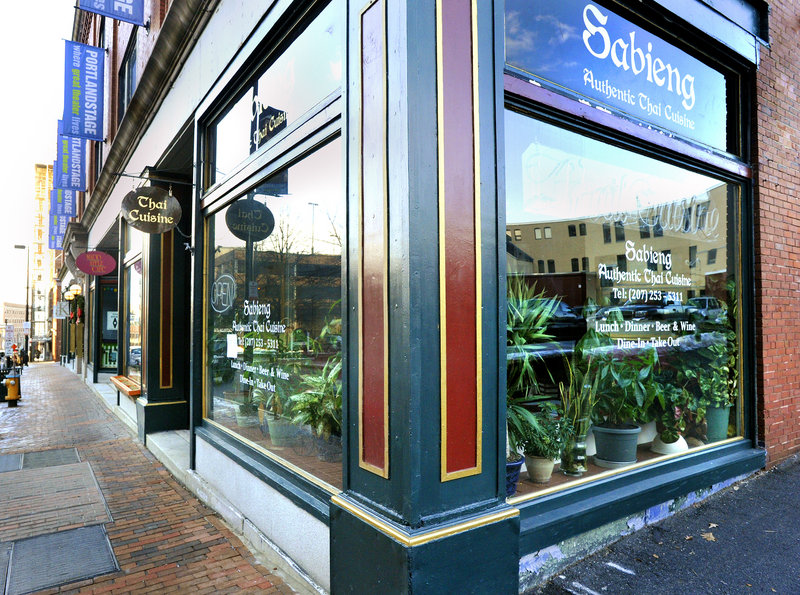Sabieng, a Thai word, means “reserved savory food eaten when someone is traveling a great distance,” according to the menu of the Maine restaurant of that name.
Although winter is just at its start, it already feels as though we have traveled a great distance from warm weather, and that has made most of us eager to eat. A good way to get started at Sabieng is the Thom Kha Gai ($4). Served in a white china bowl, the classic coconut milk, lime juice and lemongrass soup explodes with flavor. The broth was excellent, and the only drawback to the soup was the disconcerting, mushy texture of the thin-sliced white chicken meat.
Thai fish cakes ($8) appealed with savory flavors, from the exterior of the little resilient reddish-brown discs to the mild taste of pureed seafood and poetry of lemongrass. A dish of clear syrupy dipping sauce cut its sugary intensity with cilantro and lemongrass, making it pungent as well as sweet.
Two other appetizers are fried tofu ($6) with a peanut sweet-and-sour sauce and Maine crab rangoons ($7) made with crabmeat, cream cheese, carrot and onion.
A glass of Hogue Cellars Riesling made an excellent drink with the Thai dishes with its honey and flowery nose. Several beers and a short wine list offered more choices.
The restaurant occupies a location that has changed hands multiple times in recent years. On one long-ago visit, the space held an Afghan restaurant. Later, Chaba Thai II and Nakornping Thai both occupied the tall-ceilinged room.
With huge front windows, a deep space and many tables, a lack of customers can seem more obvious that it might otherwise. Plain wall decorations and inconspicuous hanging lights keep the space simple, and glass-topped tables with tablecloths and wooden chairs, red carpeting and red-painted lower walls continue that impression. But the luxuriant plants that crowd a platform beside the large front windows fill up their space handsomely.
The organic green salad ($6) was perfection, with completely fresh mesclun, a welcome change from other Thai restaurant salads. It was dressed with ginger vinaigrette that was another successful use of sugar, this time tempered with soy sauce and brightened with ginger.
Roasted cashew stir-fry with shrimp ($13) tasted fresh and appetizing, and red pepper, onion, carrot, mushroom and crunchy cashews added allure to the modestly appealing Gulf shrimp. White jasmine rice with this dish was firm, and tasted freshly made.
Lemongrass duck ($18), however, persuaded me that it was time to stop ordering duck at Thai restaurants. A meal at the now-closed Siam in the Old Port gave me the impulse to eat duck at Thai places because the duck prepared there was juicy with a crisp skin. But it hasn’t been as good since at any Thai place I have dined at. The duck at Sabieng is “crispy,” as it conventionally is in Thai presentations, which seems to mean cooked relentlessly until all the fat in the skin is melted away and the skin is a solid crunchy mass of dark brown.
Although this treatment leaves the meat an unappealing gray, the Sabieng version was still good to eat. It would likely have been better if the dish had employed a rich curry sauce to replace the cooked-off fat of the skin, but Sabieng doesn’t have a duck curry dish on its menu.
While the red peppers, onion, mushroom and bamboo shoots were appealing and crisp-tender in the lemongrass sauce, spiced at level three and nicely hot, they could not make the duck as good as it should be. Brown rice that accompanied the dish was overcooked.
Specials have included sauteed swordfish with onion, scallions and shiitake mushrooms in ginger sauce ($15), and steamed salmon teriyaki ($16) with steamed vegetables and rice.
Pad Thai ($10 with chicken, pork, tofu or vegetables, $11 with beef flank steak, $13 with shrimp and $14 with scallops) is made with rice noodles and reputed to be highly flavored with freshly squeezed lime. Sabieng makes crispy pad Thai (same pricing) by frying egg noodles. Drunken noodles and pad se-ewe are two more Thai standards. Rad nar is made with wide rice noodles, broccoli, bamboo shoots and a house reduction.
Thai tea redolent of sandalwood warmed us up at the end of the meal. So did the hot pumpkin custard made with sugar, coconut milk, eggs and uniform, skinny sticks of orange pumpkin. That sweet, simple dish is another example of Thai comfort food at its best.
N.L. English is a Portland freelance writer and the author of “Chow Maine: The Best Restaurants, Cafes, Lobster Shacks and Markets on the Coast.” Visit English’s website, www.chowmaineguide.com.
Send questions/comments to the editors.



Success. Please wait for the page to reload. If the page does not reload within 5 seconds, please refresh the page.
Enter your email and password to access comments.
Hi, to comment on stories you must . This profile is in addition to your subscription and website login.
Already have a commenting profile? .
Invalid username/password.
Please check your email to confirm and complete your registration.
Only subscribers are eligible to post comments. Please subscribe or login first for digital access. Here’s why.
Use the form below to reset your password. When you've submitted your account email, we will send an email with a reset code.